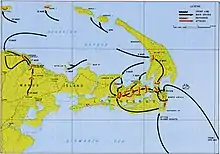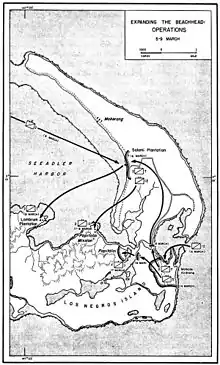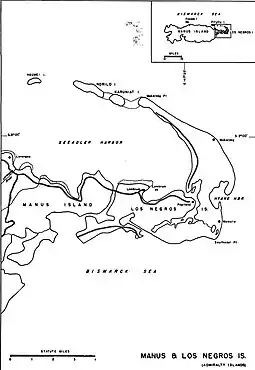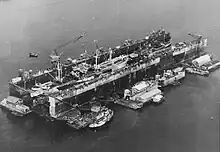
Seeadler Harbor, also known as Port Seeadler, is located on Manus Island, Admiralty Islands, Papua New Guinea and played an important role in World War II. In German, "Seeadler" means sea eagle, pointing to German colonial activity between 1884 and 1919 in that area. The bay was named in 1900 after the German cruiser SMS Seeadler.
History

On 29 February 1944, General Douglas MacArthur led Operation Brewer to take the islands from the Japanese who had occupied them beginning in 1942. The islands were secured by the Americans on 19 March 1944, who then built a large base at Seeadler Harbor including wharves and an airbase, Manus Naval Base. This US Naval Advance Base served as a staging area for further World War II operations in New Guinea and the Philippines.[1]
USS Mount Hood exploded accidentally while moored in Seeadler Harbor on 10 November 1944. The ship was carrying ammunition and the tremendous explosion caused 432 fatalities, 371 wounded, damage to surrounding ships and base from debris and sinking or severely damaging 22 smaller craft.[2]
A Japanese Mitsubishi A6M reconnaissance aircraft reported "two large aircraft carriers" at Seeadler Harbor on 22 April 1945, which were actually the U.S. Navy's Large Auxiliary Floating Dry Docks USS ABSD-2 and USS ABSD-4. Two Nakajima B5N torpedo bombers attacked the floating drydocks five nights later. Both were hit but received only moderate damage to a single pontoon each.[3]
The wrecks of the sections of large auxiliary floating drydock USS ABSD-4 and an Imperial Japanese ship amongst others are located within the harbor.[4]
Gallery
_explodes_at_Seeadler_Harbor_on_10_November_1944.jpg.webp) USS Mount Hood explodes: the smoke trails are left by fragments ejected by the explosion.
USS Mount Hood explodes: the smoke trails are left by fragments ejected by the explosion._after_the_explosion_of_USS_Mount_Hood_(AE-11)_at_Seeadler_Harbor_on_10_November_1944.jpg.webp) Aerial view of USS Mindanao after the explosion of Mount Hood at Seeadler Harbor on November 10, 1944
Aerial view of USS Mindanao after the explosion of Mount Hood at Seeadler Harbor on November 10, 1944 US Navy map Manus Naval Base in 1945
US Navy map Manus Naval Base in 1945 Ship Repair Facilities Manus Naval Base at Lombrum in 1944. Built by 46th Seabees
Ship Repair Facilities Manus Naval Base at Lombrum in 1944. Built by 46th Seabees USS Iowa being repaired at Manus Naval Base on December 28, 1944
USS Iowa being repaired at Manus Naval Base on December 28, 1944 Map Admiralty Islands operations, 29 February to 30 May 1944
Map Admiralty Islands operations, 29 February to 30 May 1944 Admiralty Islands map 1944
Admiralty Islands map 1944 Map of Manus and Los Negros
Map of Manus and Los Negros Small Auxiliary Floating Dry Dock, repairing submarine chaser PC-1121 at Seeadler Harbor in September 1944
Small Auxiliary Floating Dry Dock, repairing submarine chaser PC-1121 at Seeadler Harbor in September 1944 US Navy floating Dry Dock Number 4 in Seeadler Harbor 1945, surrounded by floating barges with workshops and a tugboat, repairing seaplane tender and Navy Liberty ship
US Navy floating Dry Dock Number 4 in Seeadler Harbor 1945, surrounded by floating barges with workshops and a tugboat, repairing seaplane tender and Navy Liberty ship_tending_PT_boats_in_Seeadler_Harbor_on_25_March_1944.jpg.webp) USS Oyster Bay tending PT boats in Seeadler Harbor on March 25, 1944
USS Oyster Bay tending PT boats in Seeadler Harbor on March 25, 1944%252C_USS_Canberra_(CA-70)_and_USS_Killen_(DD-593)_in_floating_dry_dock_ABSD-2_on_2_December_1944_(80-G-304088).jpg.webp)
_damaged_by_explosion_of_USS_Mount_Hood_(AE-11)_in_Seeadler_Harbor_on_10_November_1944.jpg.webp) Mindanao damaged by the explosion of Mount Hood in Seeadler Harbor on November 10, 1944
Mindanao damaged by the explosion of Mount Hood in Seeadler Harbor on November 10, 1944
References
- ↑ Chapter XVII: Logistic Support at Seeadler and at Sea in Beans, Bullets, and Black Oil by Rear Adm. Worrall Reed Carter, USN (Retired), retrieved 16 April 2016.
- ↑ USS Mount Hood (AE-11) entry in the Dictionary of American Naval Fighting Ships, retrieved 16 April 2016.
- ↑ AFDB-2 and AFDB-4 on PacificWrecks.com, retrieved 16 April 2016.
- ↑ Seeadler Harbor on PacificWrecks.com, retrieved 16 April 2016.
Further reading
- "Gaining Control of Seeadler Harbor". The Admiralties: Operations of the 1st Cavalry Division 29 February - 18 May 1944. Washington, D.C.: United States Army Center of Military history. 1990 [1946]. Archived from the original on 5 March 2009. Retrieved 16 June 2010. - full text
Seeadler (Sea Eagle - German) 1916 WindJammer Sailboat used for reconnaissance by the German Navy It was converted from a boat of commerce to a war and spyship in disguise. The Captain was Count Luckner according to his biography written by Lowell Thomas, "The Sea Devil published in 1928". The strategy for using a Sailboat versus a coal steam driven boat was two fold. First, to be less reliant on coal since it was not always readily available on the shipping routes. And 2nd, to allow the ship to sail further and avoid ports that would bring unwanted attention.
External links
2°01′13″S 147°21′52″E / 2.02028°S 147.36444°E